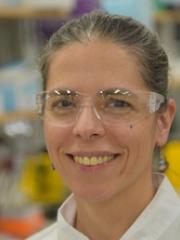Dr Lucia Zacchi

Research focus
Our research group is interested in understanding basic molecular mechanisms in biology and to use this knowledge for biotechnological applications.
Antibody discovery and development
Definitely our most applied line of research. We are interested in identifying antibodies that can bind a range of proteins with therapeutical and/or diagnostic potential. We also develop improved tools for antibody discovery. We collaborate with the National Biologics Facility and with A/Prof Keith Chappell, as well as the Australian Red Cross, and other industry partners.
Microevolution and fungal pathogenesis
We are interested in understanding how cells acquire new traits within a short period of time, a process called microevolution, and how microevolution impacts pathogenesis. The fungal pathogen Candida albicans is one of the leading causes of death due to bloodstream infections. C. albicans is a normal part of our flora, but it can become pathogenic, with devastating consequences. We are using C. albicans mutants with increased microevolution frequency to dissect the molecular mechanisms that allow this pathogen to become fatally infectious.
The secretory pathway and its biotechnological applications
We aim to better understand the cellular processes involved in the production and secretion of proteins from the cells. We use the model yeast Saccharomyces cerevisiae (Baker's yeast) and mammalian cells to study mechanisms of protein glycosylation, protein quality control, and protein degradation in the cell, under physiological conditions or during disease.
Teaching interests
Researcher biography
I am a microbiologist, molecular cellular biologist, and genetic engineer with expertise in antibody discovery and characterization, yeast and mammalian cell line development, and mass spectrometry proteomics (with a focus on post-translational modifications).
I graduated from Universidad Nacional de Río Cuarto, Argentina. I then obtained a Fulbright Scholarship to pursue my Ph.D. in Microbiology, Immunology, and Cancer Biology at the University of Minnesota, USA. For my dissertation I studied genetic and epigenetic mechanisms of phenotypic variation in the pathogenic yeast Candida albicans. I did post-doctoral work in the laboratories of Dr. Jeffrey Brodsky (University of Pittsburgh, USA), Dr. Julio Caramelo (Fundación Instituto Leloir, Argentina), Dr. Benjamin L. Schulz (SCMB, UQ), and the ARC Training Centre for Biopharmaceutical Innovation (AIBN, UQ). I have received Fellowships from the Dystonia Medical Research Foundation, CONICET-Argentina, Endeavour-Australia, and The University of Queensland.
Research Area and Impact
In my team, we believe we can help prevent, diagnose, treat, and cure diseases; and we work every day to design new antibody-based therapies and to develop novel approaches to discovering antibodies against difficult targets.
